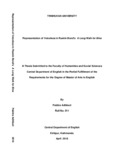Please use this identifier to cite or link to this item:
https://elibrary.tucl.edu.np/handle/123456789/3237Full metadata record
| DC Field | Value | Language |
|---|---|---|
| dc.contributor.author | Adhikari, Pabitra | |
| dc.date.accessioned | 2018-05-02T05:40:30Z | |
| dc.date.accessioned | 2021-07-23T04:29:32Z | - |
| dc.date.available | 2018-05-02T05:40:30Z | |
| dc.date.available | 2021-07-23T04:29:32Z | - |
| dc.date.issued | 2016 | |
| dc.identifier.uri | http://elibrary.tucl.edu.np/handle/123456789/3237 | - |
| dc.description.abstract | This paper deals with the representation of gendered subaltern in Ruskin Bond‘s A Long Walk for Bina. Specially, it investigates the suppression and victimization of women in the Indian society. The story shows the subordinate position of females in Koli and Nauti villages from Chamoli district of Uttarakhand of India. Using the notion of gender subaltern forwarded by Gayatri Chakravorty Spivak and Ranajit Guha, this paper argues that though the characters of the novel suffer from social, cultural, educational and economical marginalization, they remain silent unable to raise their voice against the suppression in the patriarchal Indian society. In this sense, the novel has become an effective agency of representing the repressed voice of the subaltern women. As a result, this paper will be a milestone to illustrate the repressed voice of the women in the societies, and further more it will encourage all people who are interested to help in such problems and make the concern authorities aware about the situation. | en_US |
| dc.language.iso | en_US | en_US |
| dc.publisher | Central Department of English Kirtipur, Kathmandu | en_US |
| dc.subject | Story | en_US |
| dc.subject | Females | en_US |
| dc.subject | Novel | en_US |
| dc.title | Representation of Voiceless in Ruskin Bond's A Long Walk for Bina | en_US |
| dc.type | Thesis | en_US |
| Appears in Collections: | English | |
Items in DSpace are protected by copyright, with all rights reserved, unless otherwise indicated.

